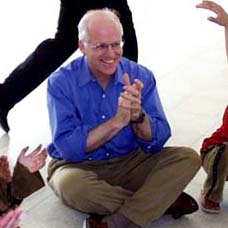
"I didn't realize the culture would be so incredibly foreign, this was way beyond what I ever anticipated," Kay said. The closest American - and Internet service - was 2-1/2 miles away. "I had been to Ukraine in 2001 with Heifer International, so I kind of knew what I was getting into - but not really. Ukraine has about 300 Peace Corps volunteers, more than any other country in the world; partly because they have a fabulous staff there and partly because there is a lot of need."
Ukraine RPCV Kay Eldon spent two years in the former Soviet state
Two years in Ukraine: Rural life in the former Soviet state
By Laura Eberly Of the News-Times
Caption: Villages in Ukraine are filled with contradictions: While most of the teenagers in Romankivtsi text message one another on their cell phones, the town has no infrastructure for indoor plumbing - villagers either carry buckets to and from the town well or dig a well on their property for water. (Courtesy photo)
Kay Eldon, assistant director of the Newport Public Library, has lived in New York City, Israel and England, among other places, and is no stranger to new cultures and ideas. As a volunteer with Heifer International, a worldwide aid program that provides developing communities with income-producing livestock and economic development training, she has traveled to Ukraine and Armenia - experiences that compelled her to once again join the international community as a Peace Corps volunteer.
In the fall of 2004, Kay received her Peace Corps assignment to the village of Romankivtsi, Ukraine. For the better part of the past two years, she has spent her time and energy teaching English and establishing an English language resource center at the Romankivtsi Gymnasium, the local school. In her free time she practiced Surzhyk, the regional language that includes a unique blend of Ukrainian, Romanian and Russian; learned to live with temperamental electricity and without running water; and brought a new perspective to a village of people living - in many ways - in conditions of 19th century America.
"I didn't realize the culture would be so incredibly foreign, this was way beyond what I ever anticipated," Kay said. The closest American - and Internet service - was 2-1/2 miles away. "I had been to Ukraine in 2001 with Heifer International, so I kind of knew what I was getting into - but not really. Ukraine has about 300 Peace Corps volunteers, more than any other country in the world; partly because they have a fabulous staff there and partly because there is a lot of need."
*
Countries that collaborate with the U.S. Peace Corps program invite volunteers, so Peace Corps members are sent to areas where their assistance is appreciated. "Because Ukraine wants to join the European Union, they realize they have to get their standards up to European standards," Kay said, including updating and expanding the schools' curriculum. In Romankivtsi, "before I came they had never heard a native speaker of English. They've seen them in films, but most are dubbed over," said Kay. During her visit, "they learned about real Americans, not 90210 Americans, not Hollywood Americans. I made it a real point to emphasize that."
The village of Romankivtsi has a population of about 3,500 people and recently celebrated its 400th year as a community. "There are plenty of animals in the village" and the unpaved streets turn to mud in the rain, Kay said. Hammered tin is used for doors and gateways. "It's amazing because the stuff never discolors so it's very attractive," she said. There is no infrastructure to facilitate indoor plumbing or running water; the village well is the primary water source.
"The water had a heavy metal content, and could have had residual radioactive fallout from Chernobyl," Kay noted, so she used well water for washing and other utility purposes, but drank only bottled water - which had to be special ordered. She rented a small house that came furnished with ornate - if a bit musty - rugs on the walls for insulation and color. "I had electricity most of the time, it came and went at whim," she said.
In the winter of 2005, temperatures dropped below -40 degrees Fahrenheit. "I had the wood stove going 24/7. I wore a hat and coat inside," Kay said. "The wind chill was wicked."
The Romankivtsi Gymnasium where she spent much of her time serves 700 students in grades one through 11; there is no 12th grade and kindergarten is held separately. Kay received grant funding to supply an English language resource center with books, books on tape, computer software and textbooks and asked family and friends to send images of America, which she hung on the walls.
"The school is old and funky, it needed paint and a lot of repair; but it's the same thing as here, there's no money so it doesn't get done," Kay said. "I tried to set up Internet through the phone lines, which were circa 1946, very old, very bad. Nothing would load and then after a couple of minutes, it would disconnect. They didn't have cell phones when I first got there because there was no antenna," she continued. Then, when the village got cell service, "people were scrambling to get them. Many people didn't have land lines because they're so expensive - they were skipping that whole stage and going straight to cell phones," which require little to no infrastructure.
The village is a mixture of old and new: students at the school text on cell phones while navigating muddy roads alongside horse-drawn carts.
"A hard thing for me was the isolation, at first they didn't get me," Kay said. "Women my age are grandmothers, they have no concept of volunteerism. They didn't understand why I would come and live without running water and not get paid and I was like, 'Well, cultural exchange.'
"There were a couple of kids who really understood what I was doing there, that they could really take advantage of me to learn English and get a better understanding of the world," she continued. "I said to them, 'If you can learn English, you can travel.' I wanted them to learn how to dream. There were a few who understood that to get out of Ukraine, they had to learn English. While their parents had gone illegally into other countries to work, this could open legal opportunities to make money and maybe come back and change the village. I have hope for them."
Coming home to Newport "isn't as strange as I thought it would be. I came back to the same place, the same job. I'm still sort of hyper aware of things like running water - and it comes out immediately and I'm like, what is that?!" Kay said. "And washing machines, I think, are one of the finest inventions. Washing sheets and towels in a bucket is not really fun.
"I appreciate this country so much, and the way I live and the way I'm able to live and the freedoms that I have. I did make some good friends there and I do miss them and wish they had the opportunities to travel that I have," Kay said. "For people who like to travel to different countries, I would put Ukraine on the map as a place to visit. The cities are pretty much like cities everywhere and the people are incredibly wonderful; for people who want to do eco-tourism and try new things, Ukraine is an absolutely beautiful place - but you have to be willing to have an adventure."
















